 I’ve been asked several times to make the distinction between promises and to-do lists. Here’s one way to look at the difference. When setting your sights on a goal you wish to reach in the future, you will typically lay out an action plan that includes the steps you will take to get from here to there, right? In other words, what you will do to arrive at your destination. Each step will have a result. While it might initially start out as a promise, you might find yourself slipping into creating a to-do list.
I’ve been asked several times to make the distinction between promises and to-do lists. Here’s one way to look at the difference. When setting your sights on a goal you wish to reach in the future, you will typically lay out an action plan that includes the steps you will take to get from here to there, right? In other words, what you will do to arrive at your destination. Each step will have a result. While it might initially start out as a promise, you might find yourself slipping into creating a to-do list.
Consider making a mental paradigm shift on the idea of goal-setting to focus on committing to weekly and monthly agreements as stepping stones to the bigger vision you have for yourself. When you identify actions you will take and promise to follow through (to yourself or anyone else) you have created an agreement to fulfill.
In other words, being congruent with your intentions and actions keeps you in integrity with your dreams and desires. How good do you feel when you say you’ll do something and then you don’t do it?
One of your goals might be to systematize your business so that you’re working more efficiently. Your steps might include:
1. Evaluating current programs and continuing to upgrade where needed.
2. Calling a web person to revamp your website.
3. Scheduling time to declutter and organizing your office.
4. Ordering new office equipment.
5. Updating your marketing material.
6. Outsourcing work.
7. Registering for a new course or training.
I make this distinction because getting caught up in making lists rather than being accountable or in integrity to the promises being made will affect the value received from masterminding. The goal is not to show how busy you are doing stuff, rather to make agreements that have a built-in intention that challenges you to s-t-r-e-t-c-h outside of your comfort zone.
The agreements you make are meant to nudge you forward and might create some discomfort so that you feeling slightly off balance. Being slightly off kilter offers opportunities to limitless possibilities that can lead to rich results. In fact, you might choose to add something in your promises that is deliberately uncomfortable with the intent of kicking things up a notch.
The promises you agree to are meant to stretch you out of your comfort zone so that you are challenging yourself to grow yourself and your business. They reflect your dreams and desires in ways that are meant to motivate and inspire you forward.
So be bold in challenging yourself to have what you desire. The possibilities are endless.
Have a great day!
 Work at home moms are still somewhat of a novelty in our society. The concept is growing, but has not yet reached many women in the corporate world. Many times when a successful work at home mom is “discovered,” she becomes an inspiration to her community and may be asked to do an interview on a local radio or TV program.
Work at home moms are still somewhat of a novelty in our society. The concept is growing, but has not yet reached many women in the corporate world. Many times when a successful work at home mom is “discovered,” she becomes an inspiration to her community and may be asked to do an interview on a local radio or TV program.

 Kim Ellis is the President of
Kim Ellis is the President of 
